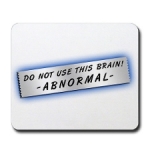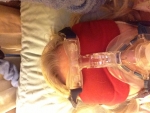prescriptions
prescriptions
I wonder why it's necessary to have a prescription to buy these machines. I've never seen any warnings that they are a hazard? why would you not just be able to buy one like a curling iron? (seems more hazardous to me than this) What can happen?
Re: prescriptions
essentially its to protect the status and incomes of the sleep lab docs and professionals
australian,anxiety and insomnia, a CPAP user since 1995, self diagnosed after years of fatigue, 2 cheap CPAPs and respironics comfortgell nose only mask. not one of my many doctors ever asked me if I snored
Re: prescriptions
JaVelin wrote:I wonder why it's necessary to have a prescription to buy these machines. I've never seen any warnings that they are a hazard? why would you not just be able to buy one like a curling iron? (seems more hazardous to me than this) What can happen?
A lot of us wonder about that. I keep saying that Ex-Lax is more dangerous than a PAP machine, yet you can buy that without a prescription. Doesn't make sense, except for harry33's comment.
Re: prescriptions
You can take enough over the counter drugs to kill yourself but I have never read an article about someone killing themself on a cpap machine or a mask they had acquired without a prescription. Medical equipment manufacturers backed up by the heavy hand of your government is the big problem.
Re: prescriptions
The prescription is so that the doctor can state what pressure your machine is to be set at when it is given to you. Just as he dictates what dosage of medicine you take. Why is that a problem?
Re: prescriptions
It's not a problem really. but the same thing could be acheived by someone using trial and error no? If a person was really lost couldn't a nurse or other manufacturer certified person help you with that ?
I think the Governments (medical establishment) this this is a way more wide spread problem than people think and it scares them. thus they want the data
I think the Governments (medical establishment) this this is a way more wide spread problem than people think and it scares them. thus they want the data
Re: prescriptions
Please note that many over the counter medications are often taken under the guidance of a physician. If you buy ibuprofen, you can take it according to the label without a doctor's instruction or advice. However, if you go to the doctor, he may advise you to buy ibuprofen over the counter but take it at twice the label-recommended dose.
Just because something sometimes needs a doctor's guidance doesn't mean it ALWAYS needs a doctor's guidance.
Why is it that people who object to making PAP machines available without a prescription never seem to object to making acetominophen, ibuprofen, Ex-Lax, etc. available without a prescription?
Just because something sometimes needs a doctor's guidance doesn't mean it ALWAYS needs a doctor's guidance.
Absolutely, for many cases of SDB. There are sometimes cases that can't be solved by individuals fiddling with a CPAP machine. But as you point out, they could go to a doctor for advanced help. In the meantime, there is no reason to deny others the ability to get relief through self-administration, any more than we should deny all pain sufferers relief through self-administration by making ibuprofen prescription only.JaVelin wrote:It's not a problem really. but the same thing could be acheived by someone using trial and error no?
Why is it that people who object to making PAP machines available without a prescription never seem to object to making acetominophen, ibuprofen, Ex-Lax, etc. available without a prescription?
Re: prescriptions
Sometimes manufacturers want the device considered a prescription item to allow them to be paid more. I also believe that if these were not prescription devices many insurance policies would not cover them.
While I am not a fan of DMEs I do not believe that they have any significant impact on what is a prescription item.
My impression is that there are likely some situations where using CPAP without a physician could lead to some problems or more likely would be a waste of time and money. Thus I would go the route of starting CPAP without a physician only if the other options were lousy.
It is not illegal, in California, for the patient or imediate family member to change the pressure on his own but it is illegal for another person to do so without being licensed such as a doctor or RT. This is similar to many provisions that are intended to protect consumers from bad actors.
From my exerience I have often found it difficult to tell if one pressure is better than another. Thus a knowlegable sleep specialist can do a better job comming up with the starting pressure.
While I am not a fan of DMEs I do not believe that they have any significant impact on what is a prescription item.
My impression is that there are likely some situations where using CPAP without a physician could lead to some problems or more likely would be a waste of time and money. Thus I would go the route of starting CPAP without a physician only if the other options were lousy.
It is not illegal, in California, for the patient or imediate family member to change the pressure on his own but it is illegal for another person to do so without being licensed such as a doctor or RT. This is similar to many provisions that are intended to protect consumers from bad actors.
From my exerience I have often found it difficult to tell if one pressure is better than another. Thus a knowlegable sleep specialist can do a better job comming up with the starting pressure.
Re: prescriptions
Billions of dollars are wasted every year by consumers self-diagnosing and taking supplements without really knowing whether they need it or whether it helps. (I'm one of those who participates in that.) Wasting time and money is not a good reason to keep it Rx only.Kevin G. wrote:My impression is that there are likely some situations where using CPAP without a physician could lead to some problems or more likely would be a waste of time and money.
I would whole-heartedly agree with that. Still wouldn't change my opinion, though.Kevin G. wrote:Thus a knowlegable sleep specialist can do a better job comming up with the starting pressure.
That misunderstands economic basic principles. You can make a lot more money selling a $5 item to millions than selling a $50 item to hundreds. We have many examples on this very board of people buying without insurance. Indeed, I bet cpap.com does a lot of non-insurance business. Taking machines and masks off of Rx will certainly lower the price, but it isn't clear that people couldn't afford them without insurance even if the price was not lower.Kevin G. wrote:Sometimes manufacturers want the device considered a prescription item to allow them to be paid more. I also believe that if these were not prescription devices many insurance policies would not cover them.
I certainly assume that if the devices become non-prescription, insurance will no longer cover them. I personally don't care, even though I have insurance. I can already acquire most of what I need cheaper without using insurance.
- chunkyfrog
- Posts: 34545
- Joined: Mon Jul 12, 2010 5:10 pm
- Location: Nowhere special--this year in particular.
Re: prescriptions
Remember when practically all allergy medicine was RX-only?
Oddly, when the patents expired, many of these drugs became OTC
Hmmm!
I think the answer is M-O-N-E-Y.
Prescription keeps the price up--OTC kicks up the volume.
Patient safety has very little to do with it!
Oddly, when the patents expired, many of these drugs became OTC
Hmmm!
I think the answer is M-O-N-E-Y.
Prescription keeps the price up--OTC kicks up the volume.
Patient safety has very little to do with it!
_________________
| Mask: AirFit™ P10 For Her Nasal Pillow CPAP Mask with Headgear |
| Additional Comments: Airsense 10 Autoset for Her |
Re: prescriptions
Chunky, I think control is just as important as money. Governments hate giving up control over peoples lives. When the government gives up control they give up power and Washigton is all about power. Our Founding Fathers preached limited government. Todays politicians are trying to control every move you make. What kind of car you drive, what you eat, what kind of light bulb you buy, and on and on. You see, they know what's better for you than you do. That is their attitude. But, there is change in the air. I think some of them are fixing to find out that they work for us, we don't work for them.chunkyfrog wrote:Remember when practically all allergy medicine was RX-only?
Oddly, when the patents expired, many of these drugs became OTC
Hmmm!
I think the answer is M-O-N-E-Y.
Prescription keeps the price up--OTC kicks up the volume.
Patient safety has very little to do with it!
Re: prescriptions
For DME - the RX status doesn't really have anything to do with coverage (normally anyway). Example would be mobility aids like crutches and canes etc. You can buy them OTC, but most companies will pay for them as DME. Having said that most insurance companies require you to have a doctor's prescription to prove medical necessity - but the device itself does not have to require an RX based on the FDA.
Probably confused the issue here even more. So DME does require documentation to prove medical necessity (which is generally in the form of an RX), but the legal status of a device is usually not relevant for DME. (Different matter for most drug coverage - they usually restrict it to RX only except for insulin).
Probably confused the issue here even more. So DME does require documentation to prove medical necessity (which is generally in the form of an RX), but the legal status of a device is usually not relevant for DME. (Different matter for most drug coverage - they usually restrict it to RX only except for insulin).
Re: prescriptions
Nobody has mentioned the FDA. The laws that are enacted by our Congresscritters to establish the FDA specify that anything that is intended to diagnose, treat, etc, etc any disease or condition must be approved by the FDA. (Drugs like aspirin are in a class of excpetions that were in use before whatever date and are considered "grandfathered," but not necessarily approved.)
So, xPAPs are required by law to get FDA approval. (Not even going to any arguments about what OUGHT to happen.) That's the way the law reads at this time, as I understand it. Getting FDA approval of a devise is expensive. (Approval for drugs is even more expensive, though.) I think that that factor somehow plays in to the "prescription only" status of the devices.
JMHO.
So, xPAPs are required by law to get FDA approval. (Not even going to any arguments about what OUGHT to happen.) That's the way the law reads at this time, as I understand it. Getting FDA approval of a devise is expensive. (Approval for drugs is even more expensive, though.) I think that that factor somehow plays in to the "prescription only" status of the devices.
JMHO.
_________________
| Machine: PR System One REMStar 60 Series Auto CPAP Machine |
| Additional Comments: Encore Basic Software; Pressure >7 |
Howkim
I am not a mushroom.
I am not a mushroom.
Re: prescriptions
I don't think that's generally true. Have you checked the price of Zyrtec, which is OTC?chunkyfrog wrote:Prescription keeps the price up
I wish I could remember, I saw an example recently of some medication that was available both OTC and by Rx. The OTC version was more expensive, even if you had no insurance to cover the Rx.
So it's not always true that being OTC lowers the price. What REALLY lowers the price is being off patent. When generics are allowed, then the meds get much cheaper, regardless of whether they are Rx or OTC.
Re: prescriptions
FDA = Governmenthowkim wrote:Nobody has mentioned the FDA.
JMHO.
















